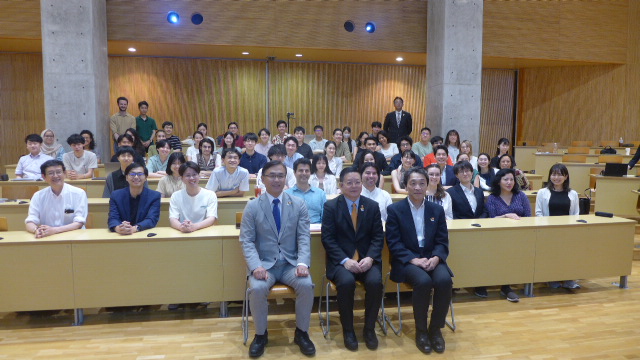Lecture and Dialogue with Students – Kao Kim Hourn, Secretary-General of ASEAN
- Date:Fri, Jul 07, 2023
- Time:15:10-16:30
- Location:Fukutake Learning Theater (Fukutake Hall, B2), The University of Tokyo
- Language:
English
- Host:
Institute for Advanced Studies on Asia, The University of Tokyo
- Co-Hosts:
Institute for Future Initiatives, The University of Tokyo (IFI)
Graduate School of Public Policy, The University of Tokyo
This year marks the 50th anniversary of ASEAN-Japan Friendship and Cooperation. Since 1973, this relationship has evolved in response to various challenges in the region and developed into an indispensable partnership. In an increasingly unstable and complex international environment, what direction will ASEAN community building take in the future? How can Japan and ASEAN cooperate for regional stability and prosperity? Secretary-General Kao, who will visit Japan on the occasion of the Special Meeting of Justice Ministers, will deliver a lecture and hold a dialogue with students.
*The lecture is organized by subsidies from the Ministry of Foreign Affairs of Japan.
On July 7, the University of Tokyo (UTokyo)’s Institute for Advanced Studies on Asia, the Institute for Future Initiatives, and the Graduate School of Public Policy co-hosted a special lecture by His Excellency Dr. Kao Kim Hourn, Secretary-General of the Association of Southeast Asian Nations (ASEAN). The President of the University of Tokyo, Dr. Teruo Fujii, opened the event with welcoming remarks highlighting the robust educational and research exchanges between UTokyo and the institutions and students from the ASEAN communities. H.E. Dr. Kao delivered a keynote address titled “ASEAN–Japan Cooperation: The Next 50 Years” before engaging in a dialogue with the student audience. The event was moderated by Dr. Ryo Sahashi, Associate Professor of International Relations at the University of Tokyo, and the event’s closing remarks were delivered by Dr. Takahiro Nakajima, President of the Institute for Advanced Studies on Asia.
Keynote address
Dr. Kao began his keynote address by emphasizing the longstanding partnership between ASEAN and Japan: Japan is the oldest dialogue partner among the 11 dialogue partnerships ASEAN has built over the years. According to Dr. Kao, the five decades of the ASEAN–Japan strategic partnership have been marked by cooperation in a wide range of areas, including most recently in the area of law and justice and in their vision for the Indo-Pacific, in which the “ASEAN Outlook on the Indo Pacific,” ASEAN’s guide for engagement in the Asia–Pacific and Indian Ocean regions, was supported by Japan. In discussing the defining features that characterize the ASEAN–Japan cooperation, Dr. Kao outlined four pillars: trust, friendship, partnership, and goodwill. As ASEAN and Japan celebrate the 50th Anniversary of their friendship this year, he hoped that the upcoming ASEAN–Japan Commemorative Summit, which will be held in Tokyo in December, will produce concrete deliverables that can promote further cooperation between the two sides.
Dr. Kao presented an optimistic outlook on the future of the ASEAN–Japan relations. He identified five priority areas for the next 50 years of the esteemed partnership: A) boosting people-to-people ties, with a particular focus on younger generations; B) maintaining peace and security in an increasingly uncertain and complex international security environment, including the need to achieve nuclear disarmament; C) protecting our planet through actions such as fostering the green energy transition and advancing global cooperation on climate change and disaster risk reduction; D) creating prosperity, including addressing challenges in trade and investment given the rapid growth of the ASEAN members’ economies; and in light of the significant impact COVID-19 has had on the globe, E) managing pandemics.
Dialogue with students
Following Dr. Kao’s remarks, the floor was opened to questions from the student audience, some of which centered on assessing the current ASEAN–Japan relations, including the potential risks and limitations of the bilateral cooperation in the Indo–Pacific region and the effectiveness of Japan’s promotion of universal health coverage in the region.
Many questions touched upon the foundations that define ASEAN’s culture. For example, when asked about the applicability of the non-intervention principle in crises, Dr. Kao explained that while ASEAN respects each member state’s political independence and state sovereignty, the non-intervention policy does not give license to countries to commit wrongdoings. When asked about the current state of integration within ASEAN, he stated that ASEAN’s attempt to facilitate trade and investment within the community by lowering tariffs and removing non-tariff barriers in the region has helped boost the economies of ASEAN members. Still, Dr. Kao stressed that while ASEAN has made efforts to promote integration within the region in an open, transparent, and rules-based manner, it also seeks to engage with the rest of the world through more dialogue.
There were additional questions regarding ASEAN’s role in tackling pressing issues in the region, such as Myanmar’s unstable political situation, the peaceful use of nuclear energy, and human trafficking. According to Dr. Kao, many of the issues raised are essential for ASEAN countries, and the solutions to them have been intensively discussed in past forums.

*The lecture was organized by subsidies from the Ministry of Foreign Affairs of Japan.